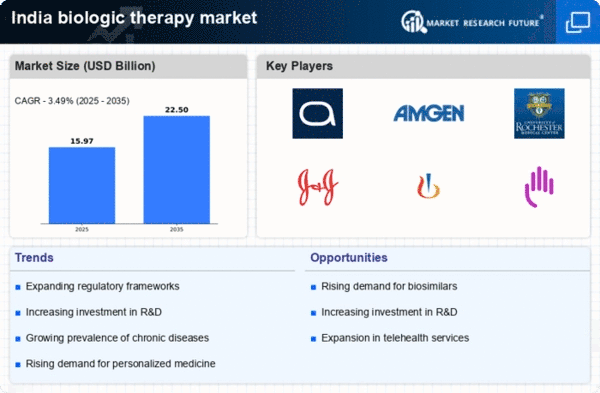Advancements in Biotechnology
Technological advancements in biotechnology are propelling the growth of the biologic therapy market in India. Innovations in genetic engineering, monoclonal antibody production, and cell therapy are transforming the landscape of treatment options available. The biologic therapy market is benefiting from these advancements, as they enable the development of more effective and targeted therapies. For instance, the introduction of biosimilars has made biologic treatments more accessible and affordable, potentially increasing patient access to these therapies. The Indian biotechnology sector is projected to reach $100 B by 2025, indicating a robust growth trajectory that will likely enhance the biologic therapy market. Additionally, collaborations between research institutions and pharmaceutical companies are fostering an environment conducive to innovation, further driving the market forward.
Rising Healthcare Expenditure
The increase in healthcare expenditure in India is a crucial driver for the biologic therapy market. As the country experiences economic growth, healthcare spending is projected to rise, with estimates suggesting an increase to 3.5% of GDP by 2025. This growing investment in healthcare infrastructure and services is likely to enhance access to advanced treatment options, including biologics. The biologic therapy market stands to gain from this trend, as healthcare providers seek to incorporate innovative therapies into their treatment protocols. Additionally, the rising disposable income among the population is enabling more individuals to seek advanced medical care, further propelling the demand for biologic therapies. This trend indicates a shift towards prioritizing quality healthcare, which is essential for the growth of the biologic therapy market.
Government Initiatives and Policies
Government initiatives aimed at promoting healthcare access and affordability are significantly impacting the biologic therapy market. The Indian government has implemented various policies to encourage the development and distribution of biologics, including tax incentives and streamlined regulatory processes. These initiatives are designed to enhance the availability of advanced therapies, particularly in underserved regions. The biologic therapy market is likely to benefit from these supportive measures, as they facilitate faster market entry for new products. Furthermore, the National Health Policy emphasizes the importance of affordable healthcare, which aligns with the growing demand for cost-effective biologic treatments. As a result, the market is expected to expand, driven by both public and private sector investments in biologic therapies.
Growing Awareness and Patient Advocacy
There is a notable increase in awareness regarding chronic diseases and the benefits of biologic therapies among the Indian population. Patient advocacy groups are playing a pivotal role in educating individuals about treatment options, thereby driving demand for biologics. The biologic therapy market is experiencing a shift as patients become more informed and proactive about their health choices. This growing awareness is leading to higher patient engagement in treatment decisions, which is likely to influence prescribing patterns among healthcare professionals. Furthermore, social media and digital platforms are facilitating the dissemination of information, making it easier for patients to access knowledge about biologic therapies. As a result, the market is expected to expand, driven by a more informed patient base advocating for advanced treatment options.
Increasing Prevalence of Chronic Diseases
The rising incidence of chronic diseases in India, such as diabetes, cancer, and autoimmune disorders, is a primary driver for the biologic therapy market. As per recent health reports, chronic diseases account for approximately 60% of all deaths in the country. This alarming statistic underscores the urgent need for effective treatment options, particularly biologics, which offer targeted therapies that can significantly improve patient outcomes. The biologic therapy market is witnessing a surge in demand as healthcare providers seek innovative solutions to manage these conditions. Furthermore, the increasing burden of chronic diseases is prompting both public and private sectors to invest in advanced therapeutic options, thereby expanding the market landscape. The focus on personalized medicine is also gaining traction, as biologics can be tailored to individual patient profiles, enhancing their efficacy and safety.
















